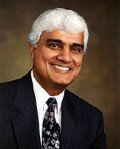
One of my favorite Christian apologists is Ravi Zacharias. His ministry is to thinking people (but I like him anyway :-)
But he also speaks to the heart.
He tells the story of an informal debate he once had with a professor of Eastern Philosophy. Over a dinner table, the professor made the case that Ravi's belief in the exclusive claims of Jesus Christ showed that his thinking was too western. If only Ravi would adopt eastern thinking, he might come to better conclusions, his Indian birth and upbringing not withstanding.
The professor explained that westerners are stuck in the rut of "either-or" thinking, where everything is either this way or that way and contradictions are not acceptable. Easterners, on the other hand, follow the superior "both-and" philosophy, where differing points of view can be accepted, even contradictory ones.
After the professor had gone on for some time, Ravi turned to him and said, “So you’re telling me I must use either the 'both-and' philosophy or nothing at all?” No answer. Ravi repeated his question. "I must use either the 'both-and' philosophy or nothing at all?” The professor finally answered, “The 'either-or' does seem to emerge doesn’t it?”
In Bedford, Massachusetts, there is a Unitarian Universalist church which I pass every day on my way to work. On the side of the building is a sign that says something like, "We are a place where differing beliefs are welcome, including yours." I feel like stopping by and asking them, "Would you welcome the beliefs of a person who doesn't welcome differing beliefs?" Sounds like "both-and" thinking to me.
The point is that truth is exclusive. It is impossible for two contradictory beliefs to be correct. This is the Law of non-contradiction. And it applies to everyone, everywhere, all the time. Christians are often accused of being arrogant because we believe Jesus is the only way. But, if it's true, it has to be the only way. It's the law.




Amen, brother! Well put.
ReplyDeleteRavi Zacharias is also one of my favorite speakers. I hear him over the Bible Broadcasting Network. He is deep, and often hard to follow, but what I do understand is right on target – consistent with the Word of God. Your comment about calling that church’s “bluff” reminds me of the subject of intolerance. Obviously, if you approached them, they would not tolerate your “either-or” view, even though they claim to accept all beliefs. The world today is preaching “tolerance” for everything and everybody BUT Christianity. I wonder if they realize how intolerant they are of us? However, it is to be expected. At the risk of being bold, we who believe the Bible know for a certainty that there is one God, one truth (as you said ‘truth has to be exclusive’), and one way, and Jesus is it. Who is the greatest enemy of God and Christians? Satan! Is he on our side? No! Since there are only two sides – right and wrong – he is on the side of wrong; therefore he’s on the side of all religions. Christianity is not a religion. Christianity begins with God; religion begins with man.
ReplyDeleteYou make it sound like finding the truth is simple, but it is not. Would you say that the Bible must be all true or all false? II Timothy 3:16 says "All scripture is given by inspiration of God, and is profitable for doctrine, for reproof, for correction, for instruction in righteousness." The question I ask is what is "scripture?" Why is it that the Synod of Carthage in the year 397 listed which books of the New Testament could be read in church? Was there some dispute over what should be considered scripture?
ReplyDeleteSometimes finding the truth is simple and at other times it's difficult. But that was not the point of the post. The argument I am making is for the existence of truth, not the ease of finding it. Many people today question the very possibility of arriving at universal truth, and they argue that whatever you believe is "true for you" and whatever I believe is "true for me." This is illogical.
ReplyDeleteI do believe the Bible is all true. If it contradicted itself, that would not render it "all false" but it would invalidate the claim that it was given by God, and that would cast doubt on the entire work.
The word Scripture in II Timothy 3:16 is the written Word of God. And there was dispute over what should be included in the canon. But the men of the Synod were not determining what is Scripture, they were recognizing what was already determined to be Scripture in a process that was guided by God. But they had an advantage over us today in that they at least agreed it was possible to find truth.
I believe in the existence of truth, but I believe we are limited by our senses in what we can know to be true. Things that we can experience with our senses are more certain than things that are passed along by word of mouth. Natural explanations are more likely than supernatural explanations.
ReplyDelete"But the men of the Synod were not determining what is Scripture, they were recognizing what was already determined to be Scripture in a process that was guided by God."
ReplyDeleteSo certain writings were already determined to be scripture before the Synod of Carthage?
    "So certain writings were already     determined to be scripture before
ReplyDelete    the Synod of Carthage?"
Yes! The men of the Synod identified Scripture; they did not determine it. It would have been Scripture whether the Synod agreed or not.
    "I believe in the existence of truth,
    but I believe we are limited by our
    senses in what we can know to be true."
Do you know via your senses that we are limited by our senses in what we can know to be true? If you believe all truth is gained by the senses, you must reject logic, which is not known to be true via the senses. Your argument therefore is self-defeating.